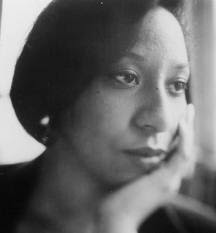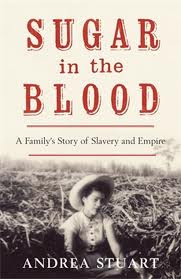Saturday, 29 September 2012
Interview with Andrea Stuart
I am very pleased to be able to include this interview with Andrea Stuart on the blog. I had been looking forward to reading Andrea's book after an extract from Sugar in the Blood appeared in Granta, (119 edition entitled Britain), in spring. Later in the year I was pleased to meet Andrea at Stoke Newington Lit Fest, where she was in conversation with Colin Grant, talking about writing family memoirs and histories. It was at that time that I asked Andrea to do this interview, as I'd included Sugar in the Blood in my books for summer list: (Books for Summer) Sugar in the Blood is an impressive work, I think a measure of a good book is that it makes you think differently and makes you do something. As a result of reading Andrea's history of her family, I actually looked up my own roots. My mother's maiden name turns out to be the name of village in rural Jamaica, where many people living there, still carry that name and I also found out that the links to the Welsh industrialist who made his massive wealth there is well known in Wales. In looking up my own maiden name, I came across an inventory of the slaves - 9 Ibo, 3 Congo - is all it said, who were on the lists of the estate that bears my father's family name in St Kitts. I am not as intrepid as Andrea to pursue these history lines, but I think that we can all read Sugar in the Blood and understand how the Caribbean story came about. Last year I read and was absorbed by Matthew Parker's The Sugar Barons, which tells of the history of the British men who became incredibly wealthy from trading sugar in the West Indies. The Sugar Barons is told from a what made the British Empire perspective, focusing on the slave owner's economic, trade and political wishes. While Andrea's Sugar in the Blood covers similar themes, her telling is based on her own family history, which is both black and white, and so making it far more powerful and personal story, particularly for those whose roots are in the Caribbean.
If you'd like to talk about Sugar in The Blood, the Stuart Hall Library Reading Group at Iniva (Institute of International Visual Arts)l Rivington Place London EC2, will be discussing the Granta extract on Thursday 15 November, 6.30-8pm. Contact: Library@iniva.org to book a place.
How did you go about tracing your family back to the C17th?
I was lucky in that some members of my family had done half the job and to complete it I read up on how to do genealogical research and completed the task.
How did you feel when you came across your first direct black ancestor?
When I came upon my first black ancestor I was both elated and deeply upset - he was listed on an inventory of slaves, no different from a planters list of cows or sheep. So I felt both thrilled that I'd found it and profoundly saddened that this was all that was left of his life.
How did you persuade your publishers to take Sugar in the Blood on?
The book didn't appeal to many British publishers - I suspect because this is a story that some British people don't want to remember - so I was grateful and delighted that my publishers Portobello went for it. In contrast the American market 'got' the book right away and I had a number of offers there.Did you meet any of your white/Ashby relatives while you were putting the book together?
I already knew some of them and have subsequently met more - proving that Atlantic slavery was not just something that happened to black people but is a story that belongs to white people as well.
What is the most surprising thing you found out when researching Sugar in the Blood?
On a wider level - I discovered how much more terrible the slave trade and plantation slavery was than even I had thought. For example that many captives took as a much as a year between capture and arrival in the New World. And how truly violent plantation slavery was. That the West Indian planters resurrected burning alive as a punishment, which hadn't been used since ancient witch trials - is one such example.
On a personal level it was the discovery that my grandfather had a number of illegitimate children and that I had an entirely new set of cousins!
Your family arrived in the UK in the 70s, almost a decade after the Commonwealth Act of '62 ended the 'Windrush' generation arrivals. How do you think that your family's experience differs from that of the earlier arrivals from the West Indies?
Well my family weren't part of the Windrush generation who were dreaming of a better life - my story is more prosaic my father is a doctor who was offered a very lucrative post here - so he took it.
In a review of the comments online (for the US edition), many people, - black and white commentators - seem to be really challenged by your exploration and analysis that connects British and Caribbean history in this way. Why do you think this is?
I'm not sure how to answer this - because I don't read a lot of the stuff that is posted. A lot of the people on these sites seem to be a bit crazy! But I'm not surprised that it causes controversy - both black and white people are still very touchy about this topic - proving my point that we haven't truly come to grips with it yet.
How (if at all) has the response to the book differed between here in the UK and in the Caribbean?
Hasn't been released there yet so can't say yet!
Tell us what you think your grandmother meant by 'It's a great life, if you don't weaken?'
I think that my grandmother had an exhausting life - she had six children, endured constant financial insecurity, and had to deal with my grandfather's infidelities, drinking and gambling - so I imagine she felt that if she at any time began to succumb to vulnerability life might overwhelm her.
I think that you book really taps into the BBCs Who Do You Think You Are? zeitgeist, what advice would you give to someone with a black Caribbean or African-American heritage who is planning to research their history?
There are some really good guides on researching this area so I'd buy one of these - eg by Guy Granuum - www.caribbeanroots.co.uk
How has writing this book differed from the writing your first two books?
This book demanded a level of research that was truly intimidating - I had to become an expert on the cane plant, the sugar industry, Atlantic slavery, colonial settlement, piracy, scientific racism - the list goes on and on...
Who is your favourite historian?
CLR James
Tell us about your perfect reader?
Someone who is curious, enjoys being stimulated and is eager to learn.
What book are you reading at the moment?
A history of eighteenth century London.
What book changed your life?
Toni Morrison's Beloved. It made me realise how visceral the impact of great writing can be.
When did you know you were going to become a writer?
I stepped into it sideways - starting writing reviews, journalism etc. I didn't admit to myself that that was what I wanted to be. But my mother says it was always obvious!
Who are your literary influences?
Very wide: the Caribbean poet Derek Walcott, the Russian writer Dostoyevsky, Toni Morrison, I love thrillers and cookbooks - I pretty much read everything!
What is your daily writing routine?
I have two small kids - so I fit it in where I can!
Tell us about your work at the Faber Academy.
I taught a Family History course for those who wanted to research and then write a family history
Did you study writing?
Not formally, but I've done a number of workshops - for example Arvon courses.
What books would you recommend for the Black Reading Group?
Gosh were to begin. At the moment I'm re-reading the African-American writer James Baldwin - what an artist!
What book do you wish you'd written?
Song of Solomon - Morrison again!
What does it mean to be a writer?
To me a writers job is to make others look at their world in a new way.
What is your favourite place for writing?
Anywhere quiet!
What are you most proud of writing?
I havent written it yet!
What are you doing next to promote your Sugar in the Blood?
I've got a number of events - some put on by local councils eg Willseden and a number of national literary festivals.
What are you working on now?
A fiction idea that I've been interested in for some time.
What question should I have asked you and what is the answer?
What do I feel about the book now that I have some distance on it?
My feelings since the book has been published are complex. With every book I've written I always feel ambivalent - in retrospect I can see their limitations and also see their strengths. But overall my feeling about this book is one of pride - I think that despite its flaws the book tells an important story, one that fills a gap in British history. It reminds us how the present Black British presence connects with Britain's colonial past; and how much the people of colour who have settled here have contributed to Britain's wealth and privilege. In summation how intertwined the story of white and black Britain is.

